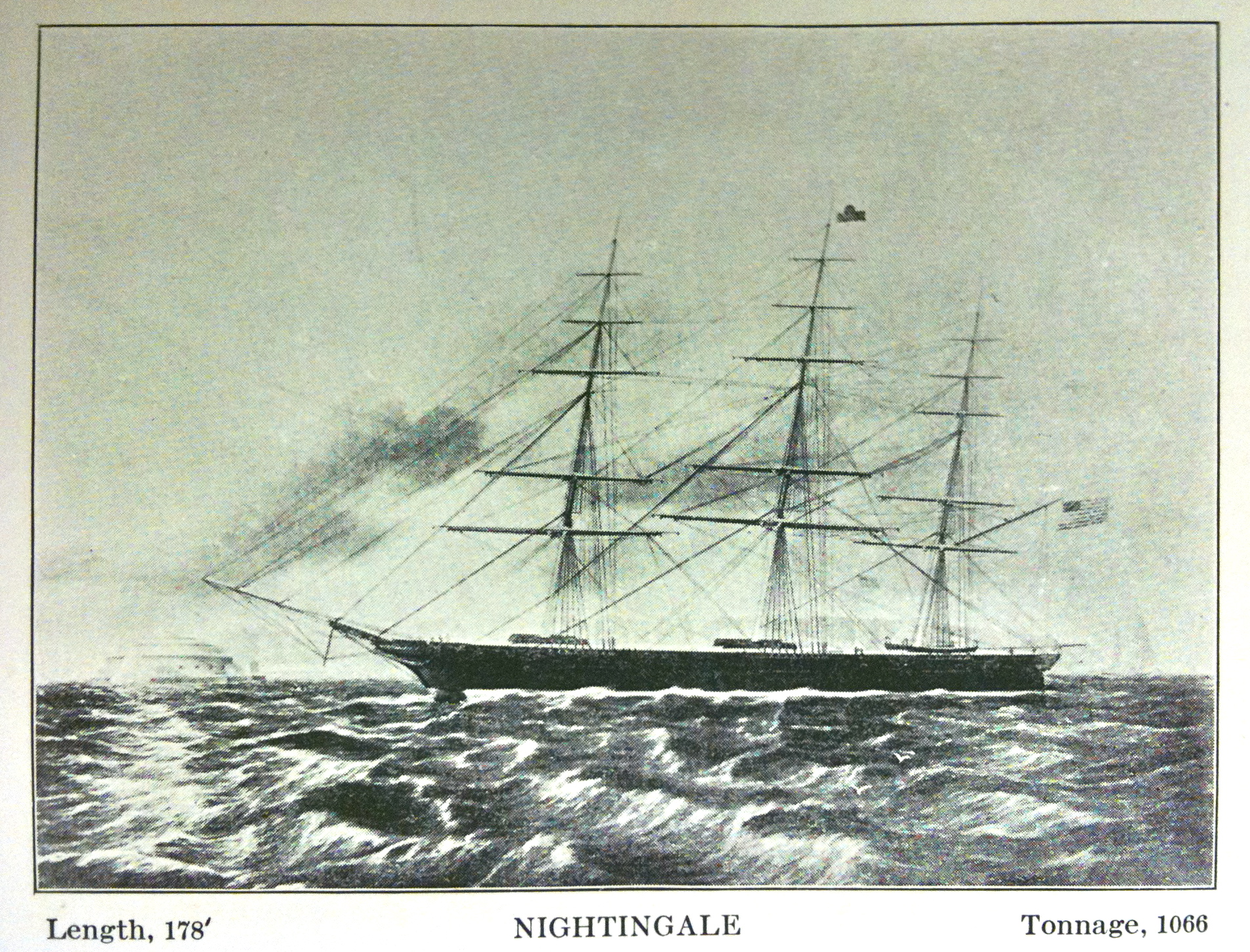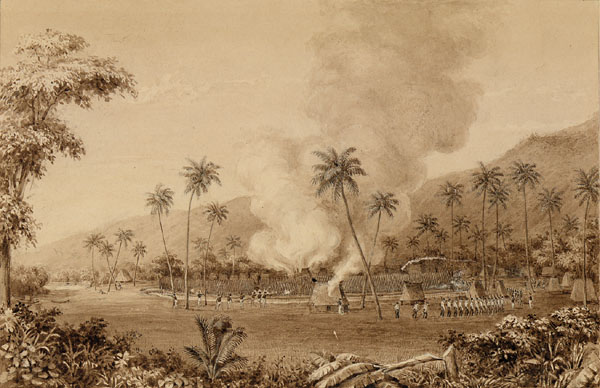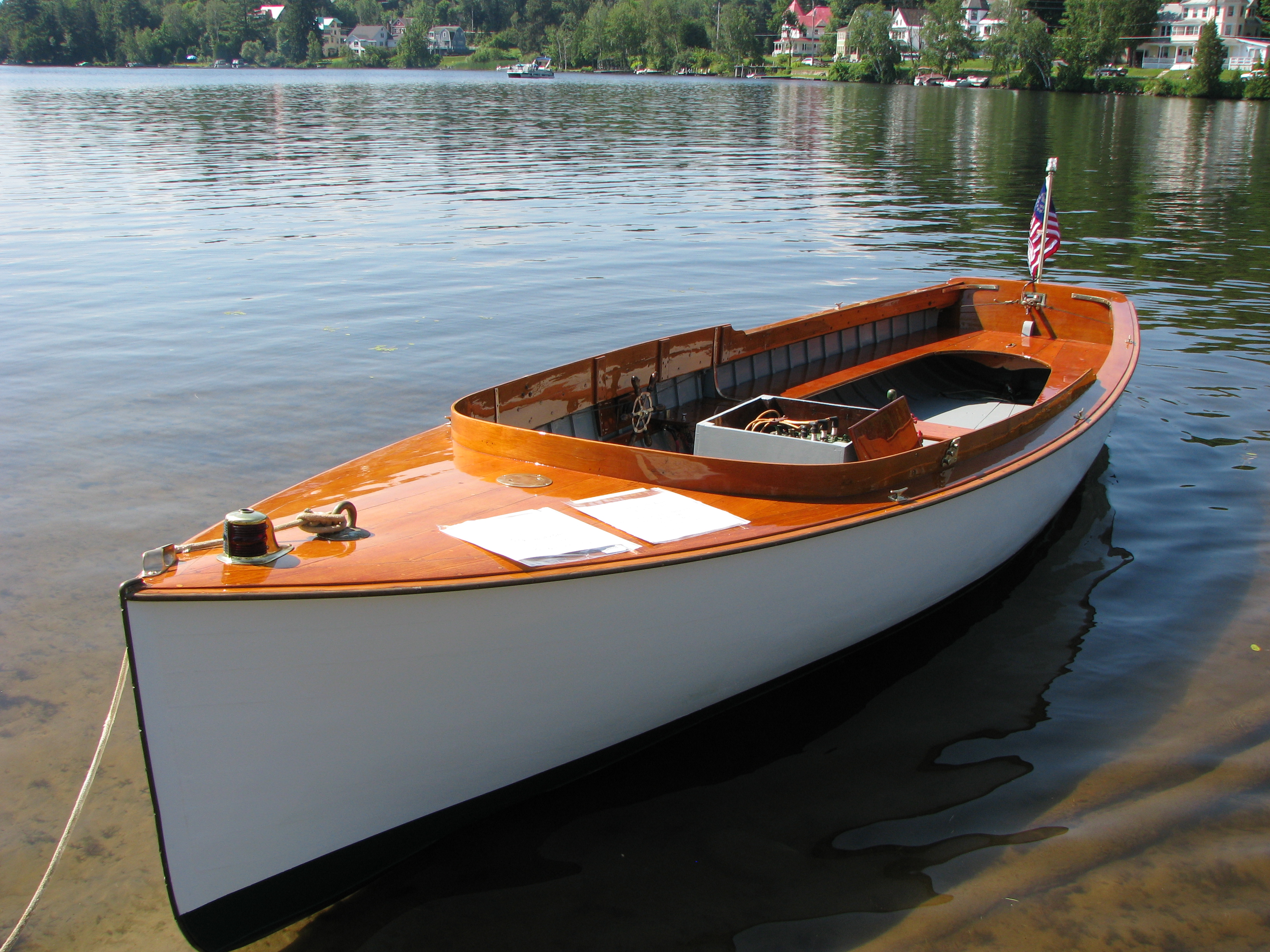|
Johanna Expedition
The Johanna Expedition, or Anjouan Expedition, was a naval operation that occurred in August 1851 during the American anti-slavery patrols off Africa. The event was unrelated to slavery and began after the seizure of the merchant ship ''Maria'' and her captain at Johanna Island. The United States Navy sent a sloop-of-war to free the captain, who was still being held, and to demand compensation for the incident. When Sultan Selim refused, the Americans briefly bombarded the island's fortifications. Expedition In April 1850, the whaler named ''Maria'', of New Bedford, Massachusetts, under a captain named Moores, was one of many American ships that used Johanna city as a port for resupplying before heading back out to sea. While doing so, the captain and his crew were seized by the Johannans and the ship was captured. When word reached American naval forces, conducting anti-slavery operations off Africa, Captain William Pearson, of the sixteen gun sloop proceeded to Johanna. It ... [...More Info...] [...Related Items...] OR: [Wikipedia] [Google] [Baidu] |
African Slave Trade Patrol
African Slave Trade Patrol was part of the Blockade of Africa suppressing the Atlantic slave trade between 1819 and the beginning of the American Civil War in 1861. Due to the abolitionist movement in the United States, a squadron of U.S. Navy warships and Cutters were assigned to catch slave traders in and around Africa. In 42 years about 100 suspected slave ships were captured.Heritage Auctions, Inc, pg. 34–36. Operations Origin The first American squadron was sent to Africa in 1819, but after the ships were rotated out there was no constant American naval presence off Africa until the 1840s. In the two decades between, very few slave ships were captured as there were not enough United States Navy ships to patrol over 3,000 miles of African coastline, as well as the vast American coasts and the ocean in between. Also, the slavers knew that if they hoisted a Spanish or Portuguese flag they could easily escape pursuit. Congress made it difficult for the navy to keep a small ... [...More Info...] [...Related Items...] OR: [Wikipedia] [Google] [Baidu] |
Whaler
A whaler or whaling ship is a specialized vessel, designed or adapted for whaling: the catching or processing of whales. Terminology The term ''whaler'' is mostly historic. A handful of nations continue with industrial whaling, and one, Japan, still dedicates a single factory ship for the industry. The vessels used by aboriginal whaling communities are much smaller and are used for various purposes over the course of the year. The ''whale catcher'' was developed during the age of steam, and then driven by diesel engines throughout much of the twentieth century. It was designed with a harpoon gun mounted at its bow and was fast enough to chase and catch rorquals such as the fin whale. At first, whale catchers either brought the whales they killed to a whaling station, a settlement ashore where the carcasses could be processed, or to its factory ship anchored in a sheltered bay or inlet. With the later development of the slipway at the ship's stern, whale catchers were able ... [...More Info...] [...Related Items...] OR: [Wikipedia] [Google] [Baidu] |
Punitive Expedition
A punitive expedition is a military journey undertaken to punish a political entity or any group of people outside the borders of the punishing state or union. It is usually undertaken in response to perceived disobedient or morally wrong behavior by miscreants, as revenge or corrective action, or to apply strong diplomatic pressure without a formal declaration of war (e.g. surgical strike). In the 19th century, punitive expeditions were used more commonly as pretexts for colonial adventures that resulted in annexations, regime changes or changes in policies of the affected state to favour one or more colonial powers. Stowell (1921) provides the following definition: When the territorial sovereign is too weak or is unwilling to enforce respect for international law, a state which is wronged may find it necessary to invade the territory and to chastise the individuals who violate its rights and threaten its security. Historical examples *In the 5th century BC, the Achaemenid ... [...More Info...] [...Related Items...] OR: [Wikipedia] [Google] [Baidu] |
New York Times
''The New York Times'' (''the Times'', ''NYT'', or the Gray Lady) is a daily newspaper based in New York City with a worldwide readership reported in 2020 to comprise a declining 840,000 paid print subscribers, and a growing 6 million paid digital media, digital subscribers. It also is a producer of popular podcasts such as ''The Daily (podcast), The Daily''. Founded in 1851 by Henry Jarvis Raymond and George Jones (publisher), George Jones, it was initially published by Raymond, Jones & Company. The ''Times'' has won List of Pulitzer Prizes awarded to The New York Times, 132 Pulitzer Prizes, the most of any newspaper, and has long been regarded as a national "newspaper of record". For print it is ranked List of newspapers by circulation, 18th in the world by circulation and List of newspapers in the United States, 3rd in the U.S. The paper is owned by the New York Times Company, which is Public company, publicly traded. It has been governed by the Sulzberger family since 189 ... [...More Info...] [...Related Items...] OR: [Wikipedia] [Google] [Baidu] |
Barque
A barque, barc, or bark is a type of sailing ship, sailing vessel with three or more mast (sailing), masts having the fore- and mainmasts Square rig, rigged square and only the mizzen (the aftmost mast) Fore-and-aft rig, rigged fore and aft. Sometimes, the mizzen is only partly fore-and-aft rigged, bearing a square-rigged sail above. Etymology The word "barque" entered English via the French term, which in turn came from the Latin language, Latin ''barca'' by way of Occitan language, Occitan, Catalan language, Catalan, Spanish, or Italian. The Latin ''barca'' may stem from Celtic language, Celtic ''barc'' (per Rudolf Thurneysen, Thurneysen) or Greek ''baris'' (per Friedrich Christian Diez, Diez), a term for an Egyptian boat. The ''Oxford English Dictionary'', however, considers the latter improbable. The word ''barc'' appears to have come from Celtic languages. The form adopted by English, perhaps from Irish language, Irish, was "bark", while that adopted by Latin as ''barca ... [...More Info...] [...Related Items...] OR: [Wikipedia] [Google] [Baidu] |
Charles R
Charles is a masculine given name predominantly found in English and French speaking countries. It is from the French form ''Charles'' of the Proto-Germanic name (in runic alphabet) or ''*karilaz'' (in Latin alphabet), whose meaning was "free man". The Old English descendant of this word was '' Ċearl'' or ''Ċeorl'', as the name of King Cearl of Mercia, that disappeared after the Norman conquest of England. The name was notably borne by Charlemagne (Charles the Great), and was at the time Latinized as ''Karolus'' (as in ''Vita Karoli Magni''), later also as '' Carolus''. Some Germanic languages, for example Dutch and German, have retained the word in two separate senses. In the particular case of Dutch, ''Karel'' refers to the given name, whereas the noun ''kerel'' means "a bloke, fellow, man". Etymology The name's etymology is a Common Germanic noun ''*karilaz'' meaning "free man", which survives in English as churl (< Old English ''ċeorl''), which developed its depr ... [...More Info...] [...Related Items...] OR: [Wikipedia] [Google] [Baidu] |
Legal Redress
In jurisprudence, reparation is replenishment of a previously inflicted loss by the criminal to the victim. Monetary restitution is a common form of reparation. Background In the Basic Principles and Guidelines on the Right to a Remedy and Reparation for Victims of Gross Violations of International Human Rights Law and Serious Violations of International Humanitarian Law, reparation include the following forms: restitution, compensation, rehabilitation, satisfaction and guarantees of non-repetition, whereby * Satisfaction should include, where applicable, any or all of the following: .. ** (e) Public apology, including acknowledgement of the facts and acceptance of responsibility; ** (g) Commemorations and tributes to the victims; ** (h) Inclusion of an accurate account of the violations that occurred in international human rights law and international humanitarian law training and in educational material at all levels. * 23. Guarantees of non-repetition should include ** (e ... [...More Info...] [...Related Items...] OR: [Wikipedia] [Google] [Baidu] |
Marine (military)
Marines, or naval infantry, are typically a military force trained to operate in littoral zones in support of naval operations. Historically, tasks undertaken by marines have included helping maintain discipline and order aboard the ship (reflecting the pressed nature of the ship's company and the risk of mutiny), the boarding of vessels during combat or capture of prize ships, and providing manpower for raiding ashore in support of the naval objectives. In most countries, the marines are an integral part of that state's navy. The exact term "marine" does not exist in many languages other than English. In French-speaking countries, two terms exist which could be translated as "marine", but do not translate exactly: and ; similar pseudo-translations exist elsewhere, e.g. in Portuguese (). The word ''marine'' means "navy" in many European languages such as Dutch, French, German, Italian and Norwegian. History In the earliest day of naval warfare, there was little disti ... [...More Info...] [...Related Items...] OR: [Wikipedia] [Google] [Baidu] |
Launch (boat)
Launch is a name given to several different types of boat. The wide range of usage of the name extends from utilitarian craft through to pleasure boats built to a very high standard. In naval use, the launch was introduced as a ship's boat towards the end of the 17th century. On each warship, the launch was usually the largest boat out of those carried aboard. It could be propelled by oar or sail, with this type remaining in service into the 20th century. Steam launches were introduced on a trial basis in 1867, but as steam-powered ship's boats became more common, the majority were steam pinnaces. Other military examples were the various motor launches used in the 20th century, employed for harbour defence, anti-submarine patrols, escorting coastal convoys, minesweeping and recovering aircrew from crashed aircraft. Generally, these were decked boats, some of which were capable of fast speeds. A powered boat operated by a regulatory or official organisation may be termed a lau ... [...More Info...] [...Related Items...] OR: [Wikipedia] [Google] [Baidu] |
Reginald Fairfax
Reginald is a masculine given name in the English language. Etymology and history The meaning of Reginald is “King". The name is derived from the Latin ''Reginaldus'', which has been influenced by the Latin word ''regina'', meaning "queen". This Latin name is a Latinisation of a Germanic language name. This Germanic name is composed of two elements: the first ''ragin'', meaning "advice", "counsel", "decision"; the second element is ''wald'', meaning "rule", "ruler". The Old German form of the name is ''Raginald''; Old French forms are ''Reinald'' and ''Reynaud''. Forms of this Germanic name were first brought to the British Isles by Scandinavians, in the form of the Old Norse ''Rögnvaldr''. This name was later reinforced by the arrival of the Normans in the 11th century, in the Norman forms ''Reinald'' and ''Reynaud''. which cited: for the surname "Reynold". The Latin ''Reginaldus'' was used as a Latin form of cognate names, such as the Old Norse ''Rögnvaldr'', and the Gae ... [...More Info...] [...Related Items...] OR: [Wikipedia] [Google] [Baidu] |
Lieutenant
A lieutenant ( , ; abbreviated Lt., Lt, LT, Lieut and similar) is a commissioned officer rank in the armed forces of many nations. The meaning of lieutenant differs in different militaries (see comparative military ranks), but it is often subdivided into senior (first lieutenant) and junior (second lieutenant and even third lieutenant) ranks. In navies, it is often equivalent to the army rank of captain; it may also indicate a particular post rather than a rank. The rank is also used in fire services, emergency medical services, security services and police forces. Lieutenant may also appear as part of a title used in various other organisations with a codified command structure. It often designates someone who is " second-in-command", and as such, may precede the name of the rank directly above it. For example, a "lieutenant master" is likely to be second-in-command to the "master" in an organisation using both ranks. Political uses include lieutenant governor in various g ... [...More Info...] [...Related Items...] OR: [Wikipedia] [Google] [Baidu] |
Trinket , a type of pelota court
{{Disambiguation ...
A trinket may refer to: * A small showy piece of jewellery, such as a jewel or a ring. * Trinket Island, an island of the Nicobar Islands ** Trinket (village), a village on the island * Trinket snake, common name for ''Elaphe helena'', a species of colubrid snake * The original name of New Zealand rock band The Datsuns * A troll girl in the comic series Elfquest * A character in the American animated television series ''Pepper Ann'' * The English localized name of Wei Xiaobao in John Minford's translation of Louis Cha's novel ''The Deer and the Cauldron'' * A small biscuit * ''Trinkets'' (TV series) See also * Basque trinquete A trinquete (also ''trinquet'') is a special court for various indoor versions of Basque pelota, pelota and it is a modality of the Basque pelota, pelota sport. In South America, especially in Argentina the trinquete is also known as ''close court ... [...More Info...] [...Related Items...] OR: [Wikipedia] [Google] [Baidu] |



.png)


